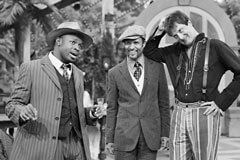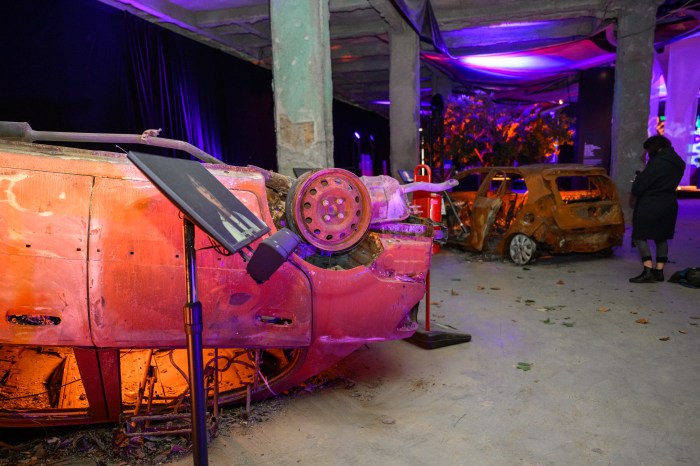David Esbjornson triumphs in Central Park re-imagining of “Much Ado”
To be really great, a romantic comedy needs those moments when, no matter how many times you’ve seen it or how well you know the story, you fear in your heart that the happy ending may not come after all. This is true of such classics as “Pride and Prejudice” or relatively recent hits like “You’ve Got Mail,” and it’s true of Shakespeare’s “Much Ado About Nothing.” Will Beatrice and Benedick end up together? Will Hero’s virtue be vindicated? These moments provide that delicious, escapist tension in which we indulge again and again because they let us believe that even if all is going against us, a happy ending is possible.
From church basements to regional theaters, the Royal Shakespeare Company, and three different productions in Central Park, I have never left “Much Ado” without feeling giddy and gleeful, the corners of my mouth stretched from smiling and my eyes wet from tearing up, and a wonderful sense of well-being. Let’s face it: I’m a sucker for this play. It is also one of Shakespeare’s richest and most sophisticated comedies, with more complex characters and subtle humor than, say, “The Taming of the Shrew” or “A Midsummer Night’s Dream.”
Yet even with brilliant material, a brilliant production is not a given, as my experience will attest. For “Much Ado” in particular, success depends on the casting, the performances and the direction.
Nonetheless, simply to call the Public Theatre’s current production of “Much Ado” in Central Park a success is almost insultingly insufficient. David Esbjornson’s magnificent production is consistently brilliant, and there isn’t a detail of the script or a character that isn’t beautifully rendered. What typically hampers productions of this play is that the focus is all on Beatrice and Benedick and the other characters more or less fade behind the comedy of their battling relationship and ultimate love. Hero and Claudio are allowed to become plastic, and virtually no attention is paid to Hero’s father, Leonato and his brother Antonio.
Not so here. Esbjornson has gone for the center of each character and elicited performances from even the most minor characters that are both compelling and original. As a result, this Beatrice and Benedick are sillier but also more sympathetic because we see them in the context of a fully developed world.
Esbjornson has chosen to set the play at the end of World War I. It’s a wonderful decision. The Victorian social order of the older characters must give way to the new conquerors of the world, and the role of women is changing dramatically too. In this setting, Beatrice’s remaining single appears to be her choice not the result of her being “too curst” for any man to find her appealing. Indeed, Benedick broke her heart before he went to war, and she is afraid to risk again, hiding behind her wit and larger-than-life personality. It takes trickery by their friends to convince Benedick and Beatrice that they do love each other, and, in this reading, once that is accomplished it is Benedick who seems to need Beatrice more. He may be a war hero, but he has a fragile ego that fears rejection, and his swagger is mostly bluster used disguise a softer and more sentimental heart.
Claudio and Hero, though younger, want to fit into the social structure as it existed before the war. Claudio’s shock that Hero has been unfaithful—a trick worked by Don John, the bastard brother of Don Pedro, the Duke whom Claudio and Benedick serve, that is intended to hurt Claudio—seems not just to smear Hero’s character but to destroy Claudio’s faith in the social order. He is duped as much by the lies of Don John as by his sense of how things should be. Hero has remained faithful, but as a woman at home during a war that changed all the rules about roles, she may have had chances to stray.
Esbjornson weaves all this together with an air of romanticism that is infectious.
The wonderful cast is the other element that makes this production shine. As Beatrice, Kristen Johnston has a comic maturity that finds both the hilarity and the vulnerabilities of the character. Jimmy Smits is a sensational Benedick, at times subtle and ay others clearly playing off his heartthrob status, but always committed to the role. Like Johnston, Smits makes every moment count, whether it’s slapstick or suppressed passion. Together, the interplay between Benedick and Beatrice is so compelling because we know these people, and we know how thorny the path can get when we fall in love.
Elisabeth Waterston is a perfect Hero and though delicate, plays her with a fire often missing from the part. Lorenzo Pisoni as Claudio finds a depth in the role also often absent. In his performance, we see more than a handsome, privileged man who escaped being killed in the war, we see a man who doesn’t want the world he fought for to change.
As Leonato, Sam Waterston is amazing. His is a tough part that demands a lot of emotional extremes, but Waterston does a beautiful job finding grief in rage and grace in grief.
Among the bad guys, Christopher Evan Welch is especially good as Don John. His rage at losing his place by the accident of birth gives him a seething and nasty quality that’s wonderfully done. Sean Patrick Thomas as Borachio, who puts the evil plot in motion, plays the role with delicious malevolence.
Brian Murray as Dogberry is perfect. It’s a tough part, but Murray is the kind of actor who, as his many successes with Beckett and Albee demonstrate, knows how to trust a text, and he delivers the most understated and ineptly loveable performance of the role I’ve ever seen.
The rest of the company, including Peter Francis James in a commanding performance as Don Pedro, Dominic Chainese who plays Antonio with fire, and Laura Kai Chen as Margaret, Jayne Houdyshell as Ursula, and Steven Skybell as Friar Francis are all delightful.
The terrific set is by Christine Jones and the lovely costumes by Jess Goldstein with excellent lighting by Michael Chybowski who manages the feat of transition from light to dark as night falls with impressive fluidity.
Taken all together, from the romance to the comedy, the heartbreak, and the ultimate rejoicing, this “Much Ado” has vibrant freshness and urgent energy that suffuses every moment of the play and draws one into the familiar story as if one were seeing it for the first time—and that’s how to do romantic comedy.


































